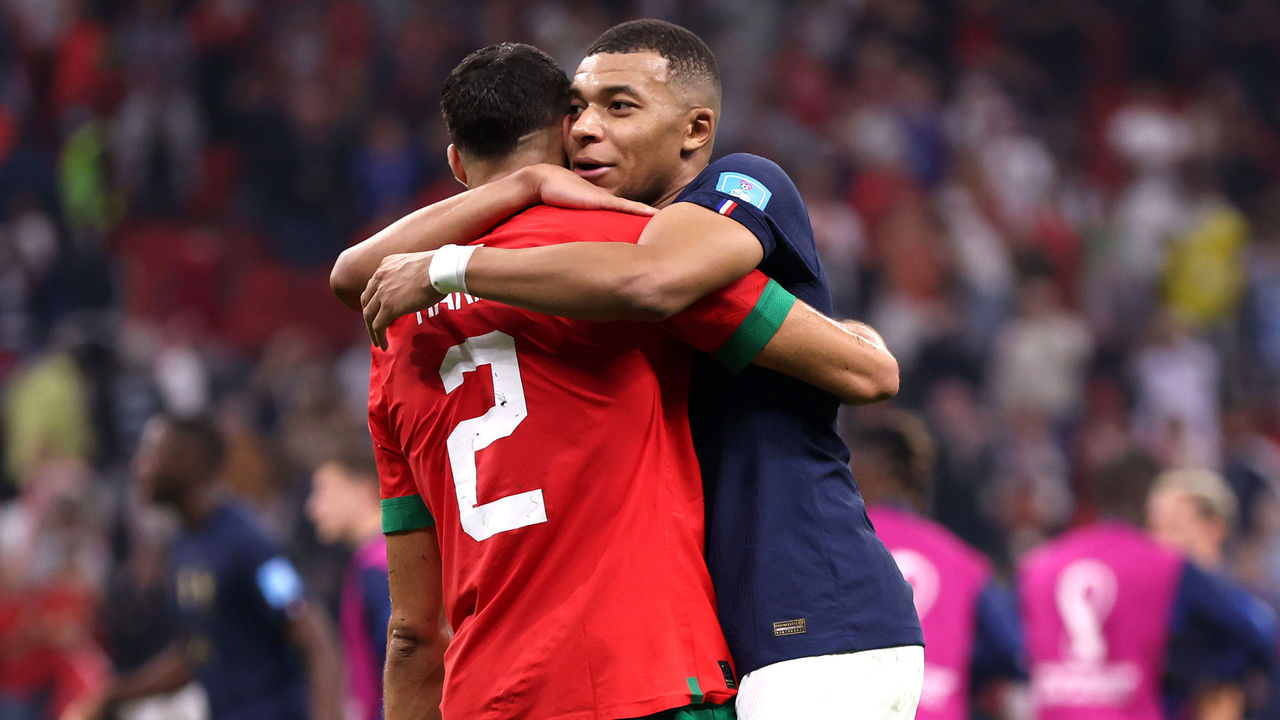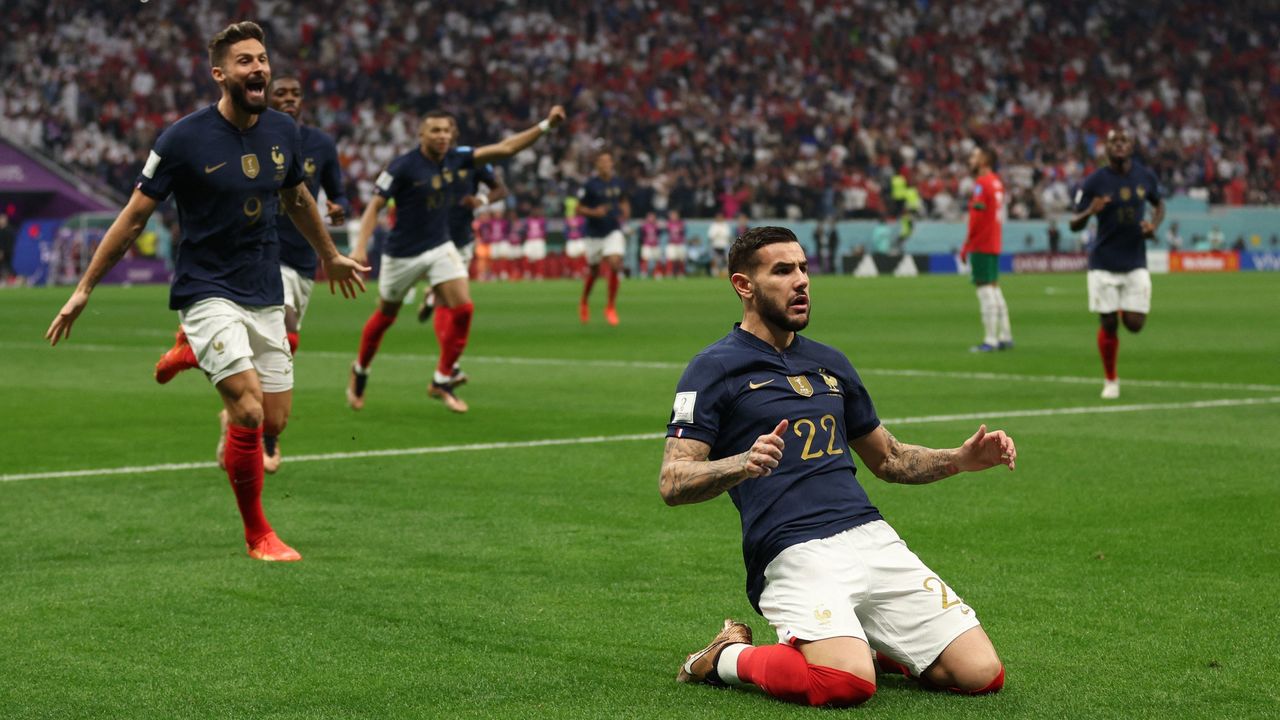How France held off lionhearted Morocco to make 2nd straight World Cup final
The 2022 World Cup is nearing its climax. After every matchday, we'll review the biggest talking points emanating from Qatar and break down all the action on the pitch. Below, we look back on France's semifinal win over Morocco.
Morocco goes down swinging
Morocco gave absolutely everything against France. It needed to find that little bit more to keep one of the most invigorating World Cup runs ever alive.
Ultimately, it was a step too far.
The Atlas Lions more than lived up to that moniker in Qatar with their lionhearted performances en route to and including Wednesday's 2-0 semifinal defeat to France. They arguably had no business pushing the reigning champion as hard as they did. Morocco was being held together by some combination of athletic tape, adrenaline, and painkillers.
Key defender Nayef Aguerd, named in the starting lineup, didn't make it through the warmup, his desperate attempt to overcome a nagging injury falling agonizingly short. Captain Romain Saiss, clearly hobbled and sporting heavy bandaging around his leg, only lasted 20 minutes before he was forced to come off, facilitating a change in formation for Walid Regragui's team. His replacement, midfielder Selim Amallah, was himself substituted in the second half amid a lingering fitness issue. Noussair Mazraoui, who missed the quarterfinal win over Portugal, was taken off at the interval. Breakout midfielder Azzedine Ounahi, clearly injured, gritted his teeth and played on for as long as he could through sheer force of will.

And, despite all of that, Morocco still pushed France to the brink. The indefatigable Sofyan Amrabat, like a T-1000, kept hounding the French players, his sheer determination in full display when he sprinted over half the pitch, head up and legs pumping, to chase down Kylian Mbappe and win the ball with a full-blooded slide tackle that had the partisan crowd roaring its approval. Achraf Hakimi was everywhere, while Hakim Ziyech and Sofiane Boufal dipped into their bags of tricks.
It wasn't enough, though. The extra touch of quality needed up front to overcome a team like France was lacking when it mattered most. Morocco did everything right but stalled inside the penalty area, either failing to get a shot off or not getting the critical bounce to get the ball over the line. Whereas France got an acrobatic finish from Theo Hernandez and a moment of inspiration from Mbappe to create its two goals, Morocco couldn't conjure up anything similar. That was the difference.
The third-place game against Croatia notwithstanding, Morocco bows out after authoring history for an entire continent, creating new fans for previously unheralded players, and leaving an indelible mark on the World Cup.
Theo Hernandez vital to France
Getting the opportunity to start and star at his first World Cup only by virtue of seeing his brother suffer a serious knee injury has surely been a conflicting web of emotions for Hernandez in recent weeks.
Theo has been a vital part of Didier Deschamps' side since Lucas, his elder brother, tore his ACL in France's opening match against Australia. Injuries had the potential to decimate Les Bleus' title defense in Qatar, with several pillars of the squad missing the competition entirely. Instead, in a weird way, Deschamps' retooled lineup could actually be benefitting France, making the team more balanced overall.

Hernandez the younger is the most glaring example. His rampaging runs forward from left-back are a vital element of France's attack, especially considering Jules Kounde, a central defender by trade, is playing right-back and, by design, offering almost nothing in attack. Theo's desire to surge forward also allows Mbappe to cut inside at will and link up with his fellow attackers without sacrificing width in the team. Lucas, for all his qualities, is the more defensive-minded of the brothers and doesn't fit France's current scheme quite as well. He would almost certainly not have been loitering inside the penalty area, like his brother, to score France's opening goal on Wednesday.
France isn't blowing teams away in Qatar. On the contrary, both England in the quarterfinals and Morocco in the semis dictated their respective matches by controlling possession. But France, despite the myriad of injuries, has retained its game-breaking ability.
The final against Argentina could follow a similar script.
Quick free-kicks
Mbappe provides the spark
For the second consecutive match, Mbappe was largely held in check. Morocco, like England, did an admirable job controlling the most explosive player in the world. But all he needs is one opening. And, as it turns out, not even that. Mbappe, surrounded by a handful of Moroccan defenders, created his own opening, wriggling out of the sea of red shirts with some rapid footwork before firing a deflected effort that careened perfectly into Randal Kolo Muani's path. The striker, introduced as a substitute just 44 seconds earlier, tapped the ball into the open net to cement France's 2-0 win. Yet again, it was a reminder that totally nullifying Mbappe is impossible.
Konate immense
Were it not for an illness sidelining Dayot Upamecano, Ibrahima Konate would have watched Wednesday's semifinal from the bench. In hindsight, his insertion into the starting lineup was vital to France's victory. Konate made a game-high five clearances at Al Bayt Stadium, including two spectacular interventions in quick succession in the second half as Morocco pressed for an equalizer and looked to be on the verge of finding it. Deschamps now has a big decision to make going into Sunday's final. Assuming Upamecano is fully recovered, does he slot right back in alongside Raphael Varane, or will Konate be rewarded for his immense display against Morocco?
Penalty shout for Morocco
Sofiane Boufal was booked for this challenge on Theo Hernandez. pic.twitter.com/5XlnZikXs2
— ESPN FC (@ESPNFC) December 14, 2022
Many were left perplexed when referee Cesar Ramos called a foul on Boufal - and showed the mercurial winger a yellow card, to boot - for a collision with Hernandez in the first half. Moroccan fans and many neutrals hollered for a penalty, suggesting that Ramos had gotten the decision backward. Drew Fischer, the lead VAR for the match, disagreed. We'll never truly know the reasoning, but it's likely that Hernandez's touch on the ball was viewed by the referees in the booth as him being in possession with Boufal running into his leg as opposed to the other way around. Had Boufal been dribbling into the area and the same contact was made, it would have been a stonewall spot-kick.
Should Saiss have started?
Moroccan captain Saiss, his left leg heavily strapped, could barely walk by the time he succumbed to the inevitable and asked to be substituted after only 21 minutes of action. Not long before, the influential 32-year-old was handily beaten in a foot race by Olivier Giroud of all people. That was a telltale sign. It begs the question: Should Saiss have started at all? He clearly wasn't anything close to fit. Regragui, likely in part to compensate for a compromised Saiss, switched from his effective 4-3-3 formation to a 3-4-3 system to begin the match. By the time Saiss slowly walked off the pitch, and Regragui reverted to type, Morocco was already down 1-0. Would things have been different if the celebrated manager had gone with his head instead of his heart? We'll never know.
Stat of the day
We're entering dynasty territory with France.
4 - France have reached the World Cup final four times in the last seven editions of the tournament (1998, 2006, 2018 and 2022), at least twice more than any other nation over the period. Arrogance. pic.twitter.com/sF6v4GhUpg
— OptaJean (@OptaJean) December 14, 2022
Tweet of the day
Morocco has truly been a joy to watch for so many reasons.
One joy of this Morocco team is how it's bringing back the "You've barely heard of this player before, and they look amazing" feeling.
— Carl Anka (@Ankaman616) December 14, 2022
Azzedine Ounahi... you have rocked my World (Cup).